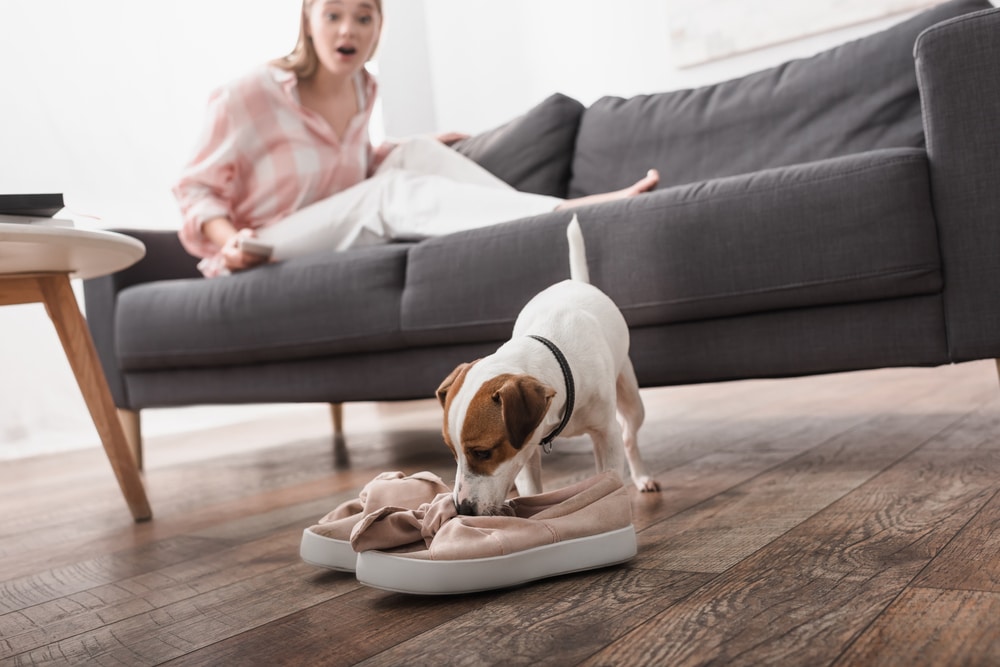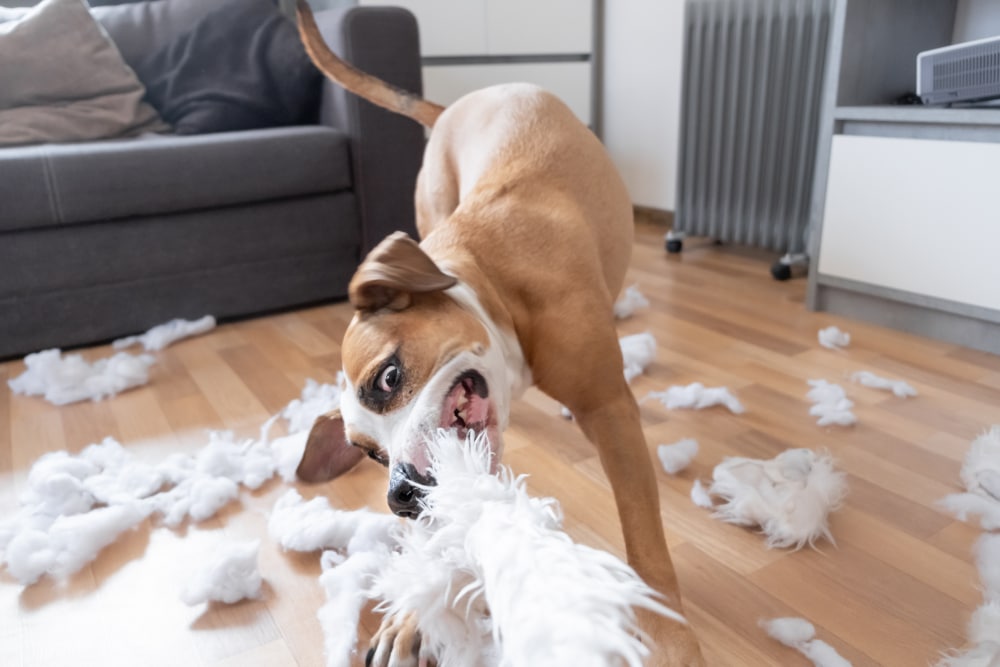Dogs are beloved family members, but sometimes they can get into trouble with their destructive behaviors. Barking, chewing furniture, and digging holes in the yard can be frustrating for your pets and you. So, how do you stop a dog from being destructive?
Creating a consistent schedule of exercise, playtime, meals, and naps for your dog is key to stopping a dog from being destructive. Providing plenty of chew toys or bones allows them to express their natural chewing instinct appropriately, while quality time spent together builds trust and socialization. Regular walks and trips to the park will keep your pet mentally and physically healthy, reducing the chance of boredom and energy-fueled misbehavior.
Table of Contents
- What Is Destructive Behavior?
- Reasons Why Dogs Become Destructive
- Proven Strategies For Curbing Your Dog’s Destructive Behaviors
- Provide Exercise and Mental Stimulation
- Establish A Consistent Schedule
- Keep Your Dog Occupied
- Teach Obedience Commands
- Spend Quality Time Together
- Praise Positive Behavior
- Give Them A Safe Space To Relax
- Monitor Your Dog’s Behavior Closely
- Understand Your Dog’s Triggers
- Seek Professional Help When Necessary
- In Conclusion: How To Stop A Dog From Being Destructive
What Is Destructive Behavior?

Destructive behavior is any action taken by a pet that damages property or causes harm to people and other animals. This includes chewing on furniture, digging in the yard, jumping on people, excessive barking, biting, and more. Destructive behavior is caused by various factors, including boredom, inactivity, fear, anxiety, or poor socialization.
If your pup is exhibiting destructive behavior, don’t despair, there are ways to help them learn more appropriate ways of expressing themselves. With consistent training and loving attention, you can transform your furry friend into a happier pet less likely to act out in undesirable ways.
Reasons Why Dogs Become Destructive
Below are some common reasons why dogs become destructive.
Boredom
When a dog is not given enough mental or physical stimulation, it may turn to destructive behaviors as an outlet for energy.
Fear And Anxiety
Dogs may exhibit destructive behavior due to fear and anxiety from being in new environments or around unfamiliar people.
Poor Socialization
Lack of socialization can cause a dog to fear other animals or people, leading to aggressive behavior.
Lack Of Exercise
Dogs need exercise to stay healthy and happy, so if they don’t get enough physical activity, it may lead to destructive behaviors as an outlet for their energy.
Attention Seeking
Dogs may become destructive to gain attention from their owners.
Proven Strategies For Curbing Your Dog’s Destructive Behaviors
Owning a dog can be one of the most fulfilling experiences in life. But when your pup starts exhibiting destructive behaviors, it can be disheartening and overwhelming. Here are some tips and tricks for keeping your pup on its best behavior.
Provide Exercise and Mental Stimulation
Dogs are incredibly active animals and require regular exercise in order to stay physically and mentally healthy. Taking your pup on daily walks, trips to the park, or playing fetch in the backyard are all great ways to provide physical exercise.
Additionally, providing mental stimulation with puzzle toys, games, and training classes can help to keep your pup entertained and reduce the chance of boredom-fueled destructive behavior.
Establish A Consistent Schedule
Creating a consistent schedule can help reduce anxiety and destructive behaviors. Set up regular times for meals, potty breaks, playtime, walks, and naps; this will give your pup something to look forward to and prevent boredom.
If they expect something at a certain time each day, it will help keep them on track and make them more comfortable in their environment.
Keep Your Dog Occupied
Provide plenty of chew toys or bones, so your pup can appropriately express their natural chewing instinct. You can also rotate their toys so they don’t get bored with the same ones. Keep your pup busy by giving them tasks to complete, like fetching a toy or treat from another room. This will help keep its mind stimulated and engaged.
Teach Obedience Commands
Teaching your pup basic obedience commands is one of the most effective strategies for curbing destructive behaviors. Commands like, “Sit,” “Stay,” and, “Leave it,” provide structure and an outlet for your dog’s energy while also reducing anxiety and stress.
Teaching these commands will not only create a calmer atmosphere in your home but will also help to reinforce the behavior you want your pup to display.
Spend Quality Time Together
Spending quality time with your pet can help build trust between you, as well as provide them with stimulation and mental exercise. Take your pup for a walk around the neighborhood or let them join you on errands like going to the store or getting mail. Playing together outside in the yard or engaging in interactive games like fetch or tug of war are also great ways to bond.
Praise Positive Behavior
Rewarding your pet for exhibiting good behavior is an effective way to reinforce the desired behavior and discourage destructive behaviors. Giving your dog treats or verbal praise when they obey commands or follow instructions can be a great motivator.
Give Them A Safe Space To Relax
Give your pet a spot where they can relax and feel secure. Create a quiet, comfortable area for them away from distractions and commotion. This will give them somewhere to unwind without feeling overwhelmed or stressed. Having their own safe space will help them learn to self-soothe, leading to fewer instances of destructive behavior.
Monitor Your Dog’s Behavior Closely
Closely monitor your dog’s behavior to determine potential stressors and triggers for destructive acts. Note any changes in their body language, vocalizations, or environment that may be causing anxiety. Be aware of the signs of distress so you can take preventative measures before problem behaviors arise. This will help ensure a safe and happy home for everyone.
Understand Your Dog’s Triggers
Try to get an understanding of what might be triggering your pet’s destructive behavior. Research possible reasons such as boredom, anxiety, fear, or lack of exercise. As soon as these triggers are identified, work towards eliminating them in order to prevent future incidents.
Seek Professional Help When Necessary
If you are unable to address destructive behavior on your own, it is important to seek professional help from a certified animal behaviorist or trainer who can provide tailored guidance for your pet’s unique needs. They can offer personalized advice and training plans to help you and your pup succeed.
These are just a few strategies you can utilize to help curb your pet’s destructive behaviors. With patience, consistency, and plenty of love, you and your pup can work together to eliminate these issues once and for all.
In Conclusion: How To Stop A Dog From Being Destructive
To stop a dog from being destructive, you’ll need patience, consistency, and loads of love. Uncover what triggers their damaging actions and work together to find a solution. With effort, you can maintain the strong bond between you and ensure a contented life for your canine companion.
So, is your dog being destructive? Are you worried they could be? Let us know in the comments below!
